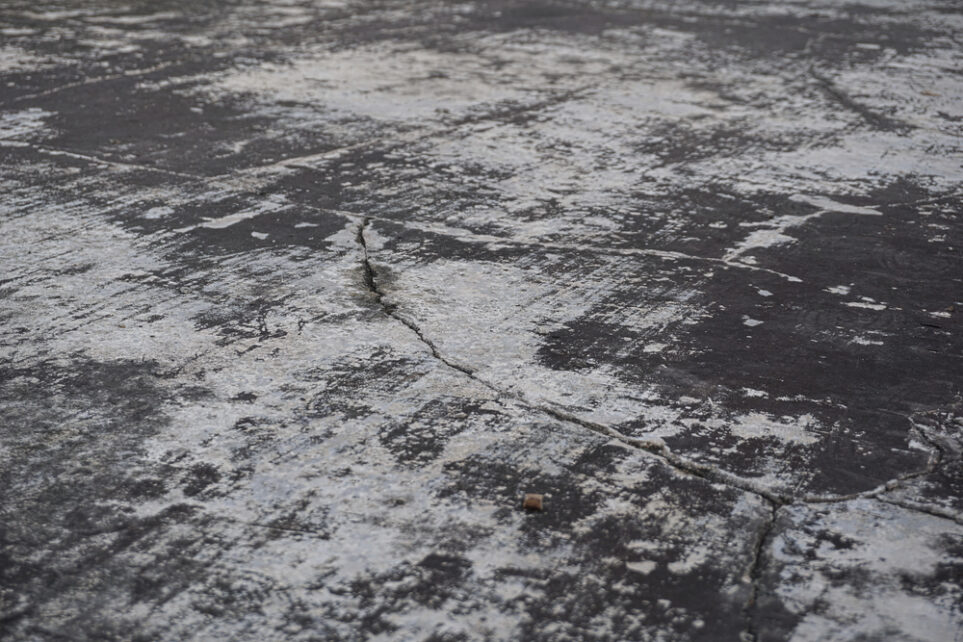Beneath your house, there is a maze of water and sewer pipes. Not many people are familiar with this labyrinth underneath a house’s slab foundation, but these pipes move water under your house. They deliver water to a house’s fixtures and connect to the main water supply lines and the sewage system of the local municipality.
As your house ages, there are many factors that can cause these pipes to crack and corrode. Because these pipes are in the slab foundation, it can be exceptionally difficult to detect when these pipes are damaged or begin to leak. Defining a leak in the slab foundation can come down to defining the common causes of a slab leak and identifying how to fix these troublesome leaks.
The expert professionals at Plumbing by Jake are here to help you protect your home’s slab foundation. If you think you have a slab leak or want to prevent this potential catastrophe, call our expert plumbers.
Defining a Slab Leak
The solid concrete foundation laid to build a house is called a slab. This slab of concrete is one of the simplest ways to add structural integrity to a home. Inside and under these slabs are an intricate design of lines bringing water into your house and sending out sewage and wastewater. This design also accounts for other facilities like gas lines.
As a house gets older, it is normal for holes to form in these pipes and for them to crack as they age or are pinched by pressure. This damage can create leaks below or inside the slab. Over time, the soil around the slab will soak up the leaking water, and the wet ground surrounding the slab will become unstable.
The moist and unsettled soil will cause the slab to deteriorate. Water will infiltrate the cracking concrete, maybe creating puddles in your basement. But if the leak goes unnoticed, the damaging slab foundation will shift. The house’s floors and walls can crack, eventually collapsing in on itself.
Roots of the Problem
Building codes before the 1980s did not require any type of moisture barrier between the slab and the surrounding soil. This is why older homes are more likely to have a slab leak. Because moisture barriers are required on all newer homes, drainage is not usually the cause of slab leaks, and the culprit is more often a problem with the pipes.
There may be an infinite number of likely problems that cause slab leaks, but in most cases, leaks come from the same four sources:
- Changing Temperature – Changing temperatures cause pipes to contract and expand. This is especially true in hot water pipes because of alternating temperatures both inside and outside pipes. These pipes are wrapped when installed, but wrapping wears and tears, and pipes burst or leak into the slab.
- Settling Ground – As the earth shifts and settles under and around slab foundations, it is like a long and gradual earthquake. The shifting ground adds pressure to the pipes, causing pipes to leak and burst.
- Chemical Reactions – Water pipes are often copper, which can react to minerals and other elements in the soil. Eventually, an event called electrolysis occurs that makes pipes decompose; cold water pipes corrode from the inside out, and hot water pipes corrode from the outside in.
- Pressure on Weak Water Lines – Water pipes running beneath a slab foundation are under a lot of pressure from the weight of the slab. Over time, these weakened pipes can be damaged. Small nicks and cracks wear away the pipes until they leak or burst.
Identifying a Slab Leak
A leak in your home’s slab foundation can become a huge problem that leads to other huge problems. By the time you notice puddles of water forming in your basement, the leak has already done tremendous damage to the house’s structural integrity.
Fortunately, there are signs a homeowner can look out for to detect a potential leak before too much damage is done. These leak indicators may include:
- A Rising Water Bill – Water leaking from pipes under and around a slab can be detected by paying close attention to your water bill. If your water bill is rising, but you are not using more water than usual, it could mean a leak.
- Mildew and Mold – Mildew and mold can act as an alarm for excess moisture in a home. A quick inspection of a house’s dark environments, like basements and crawl spaces, can help spot areas where mold and mildew are coming from a possible leak.
- Check Your Pipes – The best policy is to inspect the plumbing seasonally because temperature changes lead to so many leaks. It is also a smart idea to allow a professional plumber to perform preventative maintenance and do a thorough examination of all the pipes, even the ones you cannot see.
Let Plumbing by Jake Handle Your Plumbing Needs
There are several options when addressing the problem of a slab leak. Which option you choose depends on your willingness to dig into your home’s concrete slab. This will allow you to find the source of the leak. Digging into a slab is the most disruptive choice.
If the pipes are impossible to get to without damaging the concrete, the best alternative is usually re-routing the pipes above ground. This method avoids obtrusive digging and alleviates the pressure put on the pipes by the concrete. It also allows you to inspect the new plumbing and have easier access to it.
Every home’s slab foundation can have its own distinct situations. Working on plumbing in slab foundation takes a talented plumber. The skilled specialists at Plumbing by Jake can inspect the issues and find the best solutions to fix the problem without endangering your home.
Contact us online or call (888) 628-5890 so we can get to work for you.

